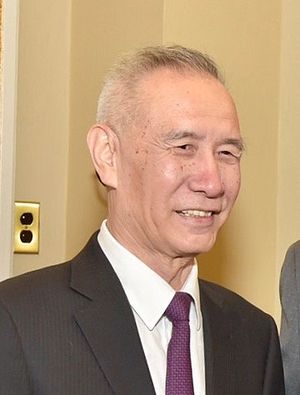He Liu
( economist, politician) | |
|---|---|
 | |
| Born | 刘鹤 1952-01-25 Beijing, China |
| Nationality | Chinese |
| Alma mater | • Renmin University of China • Harvard/Kennedy School |
| Party | Communist Party of China |
Harvard-educated economic liberal Chinese Vice Premier and confidant of President Xi Jinping. Attended the 2014 Bilderberg and gave a "special address" at the 2023 WEF AGM | |
Liu He is a retired Chinese Communist politician. From 2018 to 2023 he was Vice Premier of the People's Republic of China with the task area of Economics and Finance.
He is considered a close confidant of President Xi Jinping. He attended the 2014 Bilderberg, and gave a "special address" at the 2023 WEF AGM.[1]
Contents
Education
He is an economist and studied at the Chinese People's University, Seton Hall University and Harvard University.[2]
Career
Liu has supported Hu Jintao as an economic advisor.[3] From 2011 to 2014 he was deputy Director of the Development Research Center of the State Council. He was a member of the 18th Central Committee of the Communist Party of China from 2012 to 2017. Since 2013, he has been the deputy director of the State Development and Reform Commission, as well as the head of the Finance and Economics Department, and a member of the General Bureau of the Standing Committee of the CPC Politburo.
In October 2017, he was elected to the 19th Standing Committee of the CPC Political Bureau and continues to be the head of the Finance and Economics Department and the secretariat there. He was elected to the Standing Committee of the CPC Politburo and continues to be the head of the Finance and Economics department and the secretariat there. In March 2018, he became Deputy Prime Minister. In June 2021, it was announced that Liu was commissioned by Xi Jinping to advance the development of the third generation of semiconductors.[4]
Economic policy positions
During Liu's time at the Development Research Center of the State Council, the concept for reforms until 2020 was developed. According to Liu, eight reform projects are priority: reform of the state apparatus, deepening the reform of monopoly industries, reform of the land management system, reform of the financial system, tax reform, reform of the management of state property, building an innovation system based on enterprises, as well as a reform of the foreign trade system. As part of the reform of the state apparatus, he advocated a clearer distribution of powers between central and local governments and the prevention of arbitrary powers by local governments; in this context, he points out that the municipalities have to take responsibility for their debts themselves. According to Liu, if there is an administrative reform of land, there is a risk that the municipalities will not be able to pay off their debts, because they generate their income primarily through land leasing. In his opinion, the rural household responsibility system for the farmers must remain in place even longer. According to Liu, the financial system carries risks that occur especially at the local level.[5]
Liu is described as the economic head of the current government and it is assumed that he wants to implement economic reforms.[6]
Reform of state enterprises
Liu would like to make state-owned enterprises more efficient and reform them similar to the model in Singapore.[5] In the summer of 2018, he became active in domestic politics for the reform of state-owned enterprises in the PRC. At the 19th CPC Party Congress in October 2019, Liu said that state-owned enterprises need to become bigger, better and stronger.
Involvement in foreign trade
With regard to the foreign trade system, he calls for a further opening of the Chinese service sector. He also advocates a greater willingness to negotiate with foreign countries and supports the idea of institutions, such as the WTO, in which, in his opinion, China should become more involved.[5]
Liu He has been to the United States several times as a negotiator to negotiate with US President Donald Trump on the trade conflict between the United States and the People's Republic of China.[7] He is credited with the responsibility for world trade within the Chinese government.[8] In August 2019, Liu called for further negotiations in the escalating trade conflict with the United States. On January 16, 2020, Liu He and Donald Trump signed the so-called Phase One agreement in Washington. This was the first partial agreement reached in the trade conflict between the United States and China.[9] Liu explained to journalists that the agreement would also benefit other trading partners of China.[10] On April 17, 2020, Liu spoke by phone with Vice-President of the EU Commission Valdis Dombrovskis in order to resume talks on an investment agreement that had come to a standstill during the COVID-19 "pandemic". It is assumed that he is now focusing on talks with the EU, since compromises in the trade conflict with the USA are not visible.[11]
Events Participated in
| Event | Start | End | Location(s) | Description |
|---|---|---|---|---|
| Bilderberg/2014 | 29 May 2014 | 1 June 2014 | Denmark Copenhagen Marriott Hotel | The 62nd Bilderberg, with 136 guests, held in Copenhagen |
| WEF/Annual Meeting/2023 | 16 January 2023 | 20 January 2023 | Switzerland WEF | The theme of the meeting was "Cooperation in a Fragmented World" |
References
- ↑ https://off-guardian.org/2023/05/24/wefs-2023-summer-davos-in-china/
- ↑ https://web.archive.org/web/20180302012224/https://www.chinavitae.com/biography/Liu_He
- ↑ Miller, Tom: China's Urban Billion. Palgrave, New York 2012, ISBN 978-1-78032-141-7, S. 158.
- ↑ https://www.bloomberg.com/news/articles/2021-06-17/xi-taps-top-lieutenant-to-lead-china-s-chip-battle-against-u-s
- ↑ Jump up to: a b c Liu, He/ Li, Wei: 新一轮改革的战略和路径. 中信出版社, Beijing 2013, ISBN 978-7-5086-4245-1.
- ↑ https://www.zeit.de/2019/06/china-wirtschaft-wachstum-reformen-handelsstreit
- ↑ https://web.archive.org/web/20190423040251/https://www.zdf.de/nachrichten/heute/treffen-mit-vizepremier-liu-he-trump-glaubt-an-deal-mit-china-100.html
- ↑ https://www.sueddeutsche.de/politik/scholz-peking-china-besuch-menschenrechte-1.4293469
- ↑ https://www.scmp.com/economy/china-economy/article/3024353/china-resolutely-opposes-escalation-us-trade-war-prefers-calm
- ↑ https://www.scmp.com/news/china/diplomacy/article/3046330/us-china-trade-war-deal-liu-he-reassures-beijings-other
- ↑ https://www.scmp.com/news/china/diplomacy/article/3080563/china-moves-keep-eu-investment-talks-track